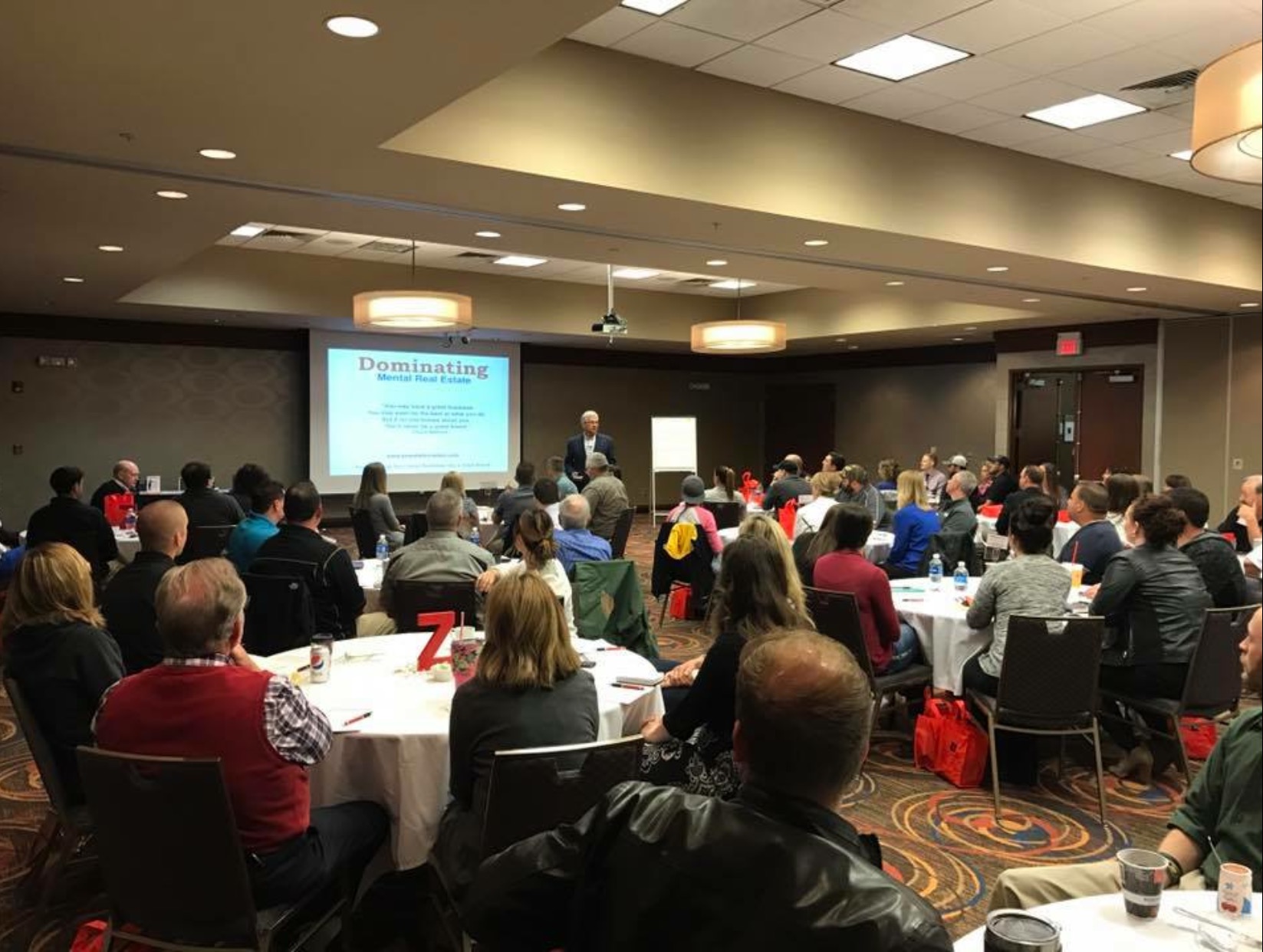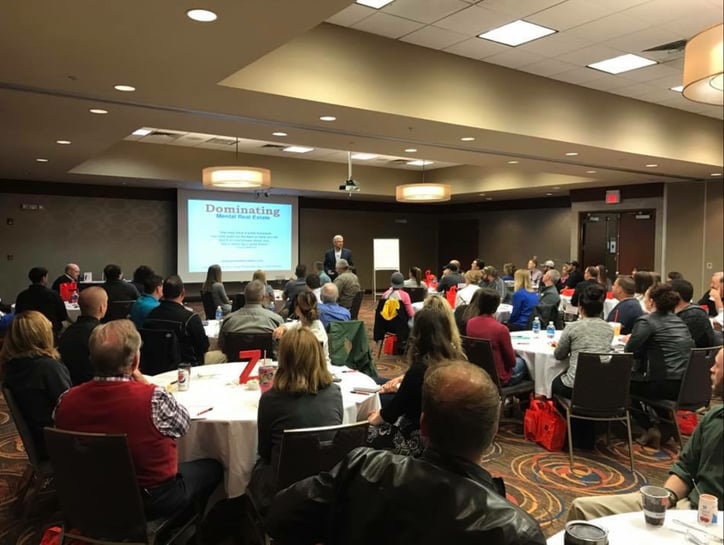Missouri Marketing Resource Blog

ICYMI: Recapping The 2019 BrandsFormation™ Seminar with Chuck Mefford

We just wrapped up our 2019 BrandsFormation™ seminar with the BrandsFormation™ author himself, Chuck Mefford. As usual, it did not disappoint. Chuck is a captivating speaker who draws in his audience from his first word to his last. His inspirational stories and words of wisdom held the attention of each person in attendance.
Pens were flying at extreme speeds, attempting to jot down every piece of advice being shared. If you were present, then you understand what we mean by this. If you were unable to attend, then we’ll shed some more light on what we mean. Here is our own attempt at note-taking during this enlightening seminar. Many key points are included; however, if you would like a more detailed analysis of Chuck’s branding and marketing advice, contact us. We would be happy to help your business uncover the secrets that Chuck Mefford shares in his seminars.
- Businesses can own: spokespersons, mascots, colors, taglines/slogans, jingles (music). (Examples: Flo is a well-known spokesperson for Progressive Insurance; The color, pink, is widely associated with Breast Cancer Awareness; “Break me off a piece of that Kit Kat Bar” has become a popular melody that most can sing on command.)
- What if you were in the position that everyone in the market had to say, “Yes,” or “No,” to your business FIRST before making a choice?
- Good branding links one memory to another. (Example: Over time, ringing a bell while offering meat to a dog will cause the dog to link the sound of a bell to the memory of the meat it was served.)
- Every day, brands are imprinting themselves into your memory without your permission! It just happens!
YOUR BUSINESS:
- What makes real estate valuable? Location, location, location!
- For businesses, “mental real estate” means: location, location, location IN THE MIND.
- Your business is only worth something if it’s in the minds of consumers! Your brand is only good if it’s in the minds of Mid-Missouri.
- Minds are delicate, fragile, and lose track easily. So, how did all of these brands get into our minds?
- Brands get into the mind because we all have metaphorical “ladders” in our heads, but they are miniature. We all only have room for remembering 2-3 options. (Example: Most can only name 2-3 brands of toothpaste; Most can only say the name of the first (and possibly second) man (men) to walk on the moon; Most can only name the first person to cross the Atlantic by plane.)
- In the end, you don’t speak to the mind. You speak to the heart. You can’t convince people to like you with facts and figures. People buy from you because of how it makes them feel.
- Steve Jobs: “Marketing is about values. It’s a noisy world, so we must be really clear about what we want people to know about us.”
GOLDFISH SPEECHES:
- Attention span of a goldfish: 7 seconds
- Everyone used to say you need an elevator pitch, which was about 25 seconds long. In today’s time-poor society, you really only have 7 seconds to leave an impression.
-
Your goldfish speech must answer 2 questions:
- Who are you?
- Why should I care?
- Answering these 2 questions should never take over 7 seconds.
- Your goldfish speech should talk about what you can DO for customers.
-
Great goldfish speeches do 3 things:
- Tell people who you are
- Tell people why they should care
- Clearly depict what is in it for the customer
YOUR CUSTOMER:
- Your business must tell people who you are and what you do – You cannot simply talk about your product. You must tell customers how your product will make them FEEL. (Example: Nike makes you feel like they are more than just a shoe company; They honor great athletes and great athleticism. They don’t just talk about their product; They make you want to “Be like Mike.”)
- Do people want a mattress, or do they want a good night's sleep?
- Do people want dental work, or do they want a great smile?
- Every touchpoint that you make with your customers will either be a moment of magic, mundane, or misery. How can you ensure that every touchpoint if a moment of magic?
- You must identify your difference maker. Others may have your products/services, but what makes you different from them?
-
What constitutes a good difference maker?
- No one else can claim it
- It gives people reason to buy
- Great branding is getting people to like you BEFORE you do business with them. This is accomplished by telling them stories.
- Before you start any marketing campaign, you MUST determine: What is success?
- Ads only matter IF THEY WORK – Doesn’t matter if you like them or not.
- Once your business determines its difference maker and develops this into a slogan or jingle, don’t mess with it! Let it work for itself!
- Do you have a discernable difference maker? If so, just say it; Don’t try to bury it. If it’s not as discernable as others, then “bluff with fluff.” (Example: Steve’s Pest Control solves pest problems, but because this is not overly discernable from their competition, they developed their slogan, “Now you’ve got a friend in the pest control business.”)
- People can be branded, but are you BONDED? What are you doing to make people like you?
-
When it comes to your business’ marketing, you must:
- Choose whether to speak directly or “bluff with fluff.”
- Write short, punchy sentences.
- Remember that great advertisements are like a rhinoceros – They should make one point, and make that point powerfully.
- Your difference maker is your business’ “mortar.” This message does not change in your advertisements. Your business’ “bricks” are the ever-changing stories that you tell in your advertisements. Bricks cause emotion.
- Radio is so effective because the ability to hear the human voice endorse a business creates more emotion than seeing something on a piece of paper without hearing any sounds.
- Trust is the fundamental essence of all business relationships.
- The most powerful word you can include in any advertisement is: YOU. Put your customer in the advertisement.
-
The Top 5 Aspects of Successful Branding are:
- Being consistent
- Understanding your customer target
- Developing an effective message
- Developing your creative/design
- Differentiating yourself/Finding why you’re unique
- While people must actively look for information on the Internet, radio is intrusive and “interrupts” people’s daily lives with its messages.
-
4 Keys to Dominant Frequency:
- Dominate – Fill up your cup; Don’t “dribble” or “spray”
- Primary Mass Media must have sound.
- Annual schedules (Radio: 25 ads/week; TV: 2 ads/show)
- Best ROI
We hope that these notes have given you a good refresher of, or for some, a good first-time look inside the 2019 BrandsFormation™ seminar with Chuck Mefford. If any one of these points (or multiple points) have sparked your interest, and you would like a more detailed analysis of Chuck’s branding and marketing advice, contact us today! Or use the link below to schedule your own Brand Marketing Workshop with our team of experts. We are in the business to help your business grow and cannot wait to help find the perfect marketing solutions for you!

